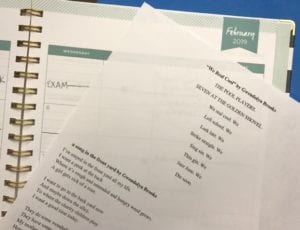When I was in school, our teachers would find ways to celebrate Black History Month, February, by working it into our established classroom culture. In history, this may have meant telling the stories of significant African Americans and their contributions to society from different eras. In English, it often meant reading literature from prodigious writers of color.
I vividly remember, even in college, reading Langston Hughes’s “Theme for English B” within the space of the 28 days of February. I was moved by Hughes’s commentary about privilege decades before the concept would finally make its way into social conversation. As is often the case and the very purpose of literature, it provided a perspective entirely different from my own.
 In my secondary and even university literature courses, I was exposed to great poets: Hughes, Brooks, Angelou, Truth, Dunbar …. The list was exhaustive and impressive. They spoke with honesty about Rivers and being a Woman and Front Yards vs. Back and drinking gin and dying. And their voices and use of devices, like the rivers Hughes referenced, were rich and deep and profound.
In my secondary and even university literature courses, I was exposed to great poets: Hughes, Brooks, Angelou, Truth, Dunbar …. The list was exhaustive and impressive. They spoke with honesty about Rivers and being a Woman and Front Yards vs. Back and drinking gin and dying. And their voices and use of devices, like the rivers Hughes referenced, were rich and deep and profound.
I adored then and still do today the writings of African Americans. But I have always cringed at the practice of teaching their literature, particularly poetry, during February. What was communicated to me then and may still be communicated to students now is that this is the only time and place that their work is relevant. I have to consider intention when reflecting on this teaching practice. I do not believe this is done with intention (I pray it isn’t). In fact, I believe that educators think they are venerating these writing greats the way that they deserve.
 But if we isolate attention to their work to a single month rather than incorporating them into the curriculum, we are robbing them of the equity they and others deserve. Whether organized chronologically or thematically, an equitable curriculum should have minority writers alongside those of the majority. Furthermore, educators, particularly English educators, should be mindful in incorporating longer works by writers of color.
But if we isolate attention to their work to a single month rather than incorporating them into the curriculum, we are robbing them of the equity they and others deserve. Whether organized chronologically or thematically, an equitable curriculum should have minority writers alongside those of the majority. Furthermore, educators, particularly English educators, should be mindful in incorporating longer works by writers of color.
Poems are short, palatable, and often an easy way to address literary themes in a short amount of time, while novels and plays take much longer. In an effort to celebrate Black History in a literature course, it’s tempting to limit the focus to those small pieces that do not interfere with the regular curriculum. But that challenges the notion of what the regular curriculum entails, and it should include novels and plays by multicultural writers.
Perhaps a more mindful and respectful way of celebrating Black History Month in an English class this year may entail revisiting the outlined curriculum to work in more multicultural pieces rather than merely reading and discussing “Still I Rise.”
Though please, read and discuss “Still I Rise.”


















